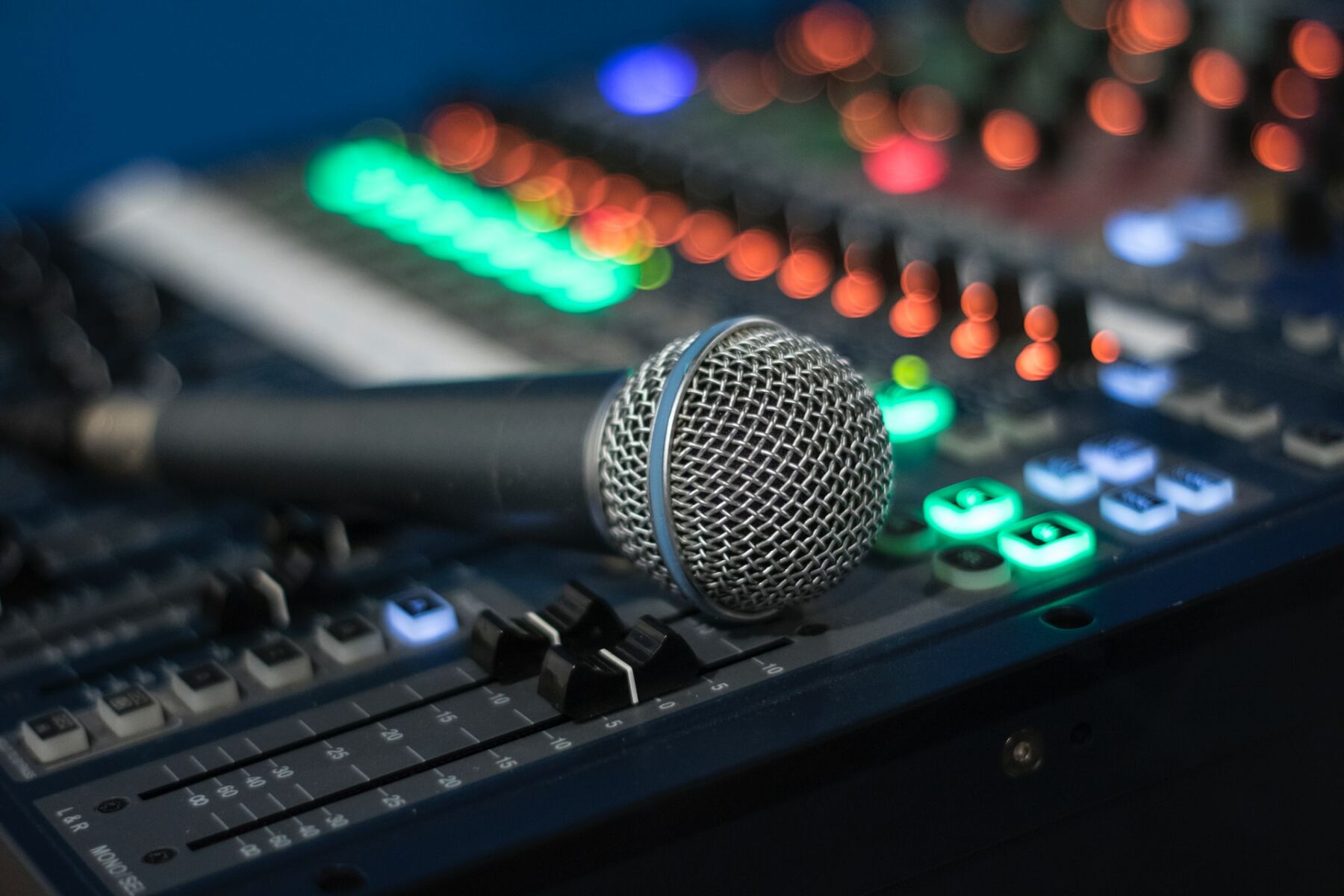
Selecting the right AV rental equipment can be challenging, especially if you want to create the best ambient vibes for your guests. When planning live concerts, weddings, corporate conferences and other events, you must ensure you have all the essential audio/visual equipment to meet the needs of everyone in attendance.
At Showtech Productions, we understand the crucial role that AV video plays when organizing these social functions. We’ve been in the AV rental equipment industry since 1997, handling a plethora of memorable productions and performances for hundreds of clients. You can trust that we understand your needs and have all the equipment for your next event.
This guide highlights the various AV rental equipment you will need, from state-of-the-art lighting solutions to cutting-edge sound systems and AV video production.
Microphones
Microphones are one of the most common AV video equipment you need for presentations, meetings and other events. They are categorized into the following types:
- Omnidirectional Microphones: These microphones can capture sounds from all angles. As such, they’re best suited for event locations with low noise and outstanding acoustics.
- Cardioid Microphones: This type captures only the sounds in front and blocks all other sounds. It’s best for large spaces and live performances.
- Line-Gradient or Shotgun Microphones: This is the mic best suited for theaters, video and film. It can eliminate the sounds coming from the sides using phase cancellation technology.
- Figure 8 Microphones: This mic captures all the sounds in the front and back and cancels out the noise from the sides. It’s best for capturing sounds from two sources and stereo recording sessions.
Mixers and Sound Boards
Mixers and sound boards will be essential if you use more than one microphone during the event. This equipment lets you control feedback, adjust the volume levels of various sound equipment and balance out sounds.
Computers
A computer is a must nowadays during events and presentations. It should have all the necessary audio and video software to mix, edit and play audio and video materials for your event.
Video Cameras
You will need cameras for video production needs. Here are some of the cameras you might need for your next event:
- Sports and Action Cameras: These portable cameras can capture fast movements. They offer better stability and a higher rate of focus.
- DSLR Video Cameras: Digital Single-Lens Reflex cameras allow you to swap lenses as needed. As such, they’re best suited for videography sessions. They have multiple features, which are helpful for various video capture styles. The downside is that these cameras are more expensive, making them a serious investment.
- Professional Grade Video Cameras: These are the most expensive cameras you can find, so it is best to rent them instead. If you’re aiming for premium high-quality videos, this is the type of camera you should use for your next event.
Sound Systems
An excellent sound system can make or break your presentation. Aside from the mixer and soundboard, you will also need an amplifier to enhance the signals from your other equipment. In addition, you may also need several types of speakers:
- Tweeter: This type of speaker produces high-frequency sounds from 2,000 Hz to 20,000 Hz. It is also known as a treble speaker. They’re typically smaller than other speakers in any setup and are constructed using light materials. They provide clear, detailed audio productions, crucial for clear music and speech intelligibility.
- Woofers: These speakers are also called bass speakers and they produce low-frequency sounds. These speakers drive sounds at low-range frequencies from 20 Hz to 2 kHz or sometimes slightly higher. They’re essential for reproducing a full range of music and sounds necessary for concerts, videos and other presentations.
- Loudspeakers: These speakers are designed to reproduce midrange frequency sounds. They handle the 1,000 Hz to 10,000 Hz range.
- Subwoofers: These speakers produce sounds below 100 Hz, which are typically lower frequency sounds than the ones produced by woofers. These speakers are also known as sub-bass speakers.
Projectors
Projectors are essential for displaying videos, images, live feeds and presentations. You can use them to display content on a screen or wall, allowing presenters to engage with the audience.
Musical Instruments
Various musical instruments are essential for concerts and live performances. Suppose your event calls for the use of these instruments. In that case, renting them instead of bringing your own might benefit you, which reduces the logistical hassles. Some artists prefer to bring their instruments, so checking with performers before renting is best.
Lighting
Some event venues may need a different type of lighting equipment that suits the needs of your event. Consider renting outdoor or indoor lighting equipment to set the mood on-site artistically. Some standard lighting equipment you can use include color washes, uplighting and spotlights.
Next Level AV Rental Equipment to Suit Your Needs
Choosing the correct AV equipment is essential for organizing a stellar meeting, event and social engagement. At Showtech Productions, we aim to provide all your needs for events you organize in the DFW area.
We have proudly served clients’ needs for over 26 years, catering to trade shows, concerts, weddings, festivals and corporate events. We ensure that your event runs seamlessly using the latest AV technology at your disposal. Check out our portfolio to learn more about your equipment options, and fill out our contact form to request a quote.


You made a great point about how projectors are necessary for showing presentations, films, photos, and live feeds. They may be used to project material onto a wall or screen, enabling speakers to interact with the audience. This will be beneficial to my father, who is organizing a fundraiser for a nonprofit organization to which he is donating. I’ll share this post of yours with him to make sure he receives all the tools he requires. Thanks!
Here are some essential things you need to know when considering projector and screen rentals:
ypes of Projectors: There are different types of projectors available for rental, such as LCD, DLP, and LCoS. Each type has its advantages and is suitable for specific purposes, so it’s essential to understand which one best fits your needs.
Lumens and Brightness: Projectors come with varying brightness levels measured in lumens. The higher the lumens, the brighter the projector’s output, which is crucial for well-lit rooms or larger screens. Consider the ambient lighting conditions in the venue to determine the appropriate brightness.
Screen Size: The size of the screen plays a significant role in your presentation’s impact. Choose a screen size that is suitable for your audience and the venue. Larger screens are ideal for larger gatherings, while smaller screens are more suitable for intimate settings.
Aspect Ratios: Projectors and screens are available in different aspect ratios, such as 4:3, 16:9, and 16:10. The aspect ratio should match the content you plan to display (e.g., PowerPoint slides, widescreen videos) to avoid distortion or black bars on the screen.
Audio Options: Consider the audio requirements of your event. Some projectors come with built-in speakers, but for better sound quality, especially in larger spaces, you may need to connect external speakers or audio systems.
Connectivity: Check the available connectivity options on the projector, such as HDMI, VGA, USB, and wireless capabilities. Ensure that the projector is compatible with your devices (laptop, tablet, etc.) to avoid any connectivity issues during your presentation.
Installation and Setup: Depending on the complexity of the setup, you may need technical assistance to install the projector and screen properly. Some rental companies offer setup services, while others may provide instructions for self-setup.
Technical Support: Inquire about the technical support provided by the rental company. Having access to technical assistance during your event can be invaluable if any technical issues arise.
Rental Duration: Determine the duration of your rental period carefully, considering setup and teardown time for your event. Rental companies often offer daily, weekly, or longer-term rental options.
Delivery and Pickup: Check whether the rental company offers delivery and pickup services. Having the equipment delivered to and picked up from your venue can save you time and effort.
Rental Cost: Compare rental prices from different companies, but also consider the quality of the equipment and the level of service offered. Cheaper options may not always guarantee the best experience.
Terms and Conditions: Review the rental agreement and understand the terms and conditions, including liability, insurance coverage, late fees, and cancellation policies.
By understanding these factors and selecting a reputable rental company, you can ensure a successful and smooth projector and screen rental experience for your event or presentation.
Planning a wedding involves meticulous attention to detail, and your guide on AV rental equipment is incredibly helpful. When it comes to gay weddings, having the right setup for a DJ is crucial. A DJ who understands the significance of the event can curate a playlist that resonates with the couple and their guests, ensuring a night filled with love, joy, and fantastic music.